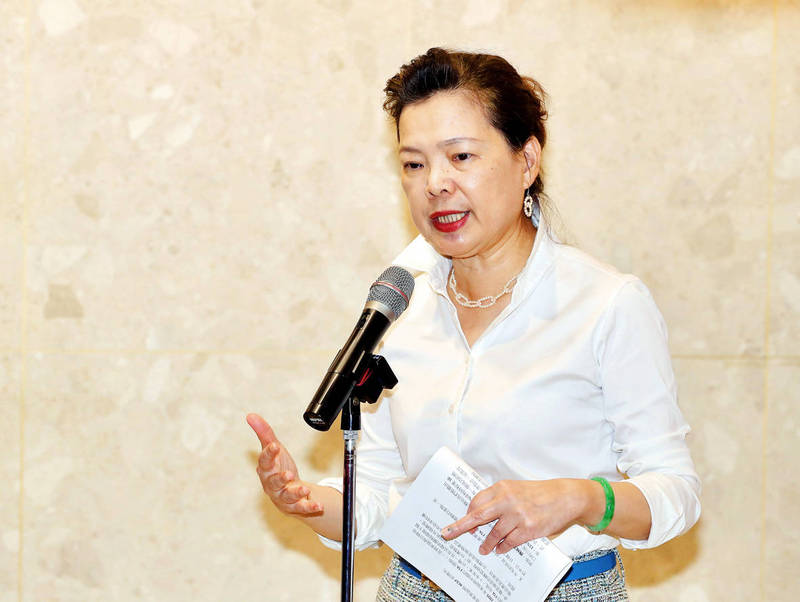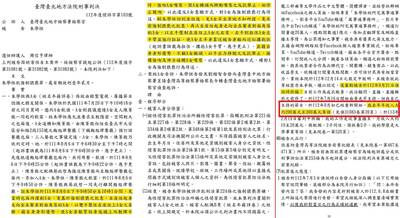《TAIPEI TIMES》 Groups, firms lament NT dollar growth

Minister of Economic Affairs Wang Mei-hua yesterday speaks to reporters after a meeting at the Ministry of Economic Affairs in Taipei with several trade associations and local companies to discuss the potential effects of the Regional Comprehensive Economic Partnership on Taiwanese industries. Photo: CNA
HARD ASK: At a meeting held by the MOEA to talk about the RCEP trade deal, trade associations said that they expect the government to push for more free-trade deals
By Chen Cheng-hui / Staff reporter
Business representatives yesterday urged the government to slow the appreciation of the New Taiwan dollar, saying that some Taiwanese industries have been undercut by rivals due to unfavorable foreign exchange rates.
The government should also assist local industries to expand their domestic market, and push for more bilateral trade deals so that Taiwanese companies can enjoy zero or preferential tariffs on exports, following the nation’s exclusion from the Regional Comprehensive Economic Partnership (RCEP) which was signed by 15 Asia-Pacific nations on Nov. 15, they said at a meeting with the Ministry of Economic Affairs (MOEA).
Some participants said that the NT dollar’s appreciation is affecting their business worse than the RCEP, while others said that the government should encourage the upgrading of local industries by providing incentive packages.
As about 90 percent of goods traded in the Asia-Pacific region would eventually be exempt from tariffs under the RCEP, the ministry held the meeting with several trade associations and local companies to discuss its potential effects.
The meeting was presided over by Minister of Economic Affairs Wang Mei-hua (王美花), while Vice Premier Shen Jong-chin (沈榮津) and National Development Council Minister Kung Ming-hsin (龔明鑫) were also in attendance. Representatives from the petrochemical, machinery, steel, machine tool, fastener, vehicle, flat-panel display, plastics, textiles and synthetic resin industries were invited.
Taiwan Industrial Fasteners Institute chairman Tsai Tu-chin (蔡圖晉) told state-run Central News Agency ahead of the meeting that the industry’s annual production value dropped to NT$143 billion (US$4.96 billion) last year, from NT$176 billion in 2018.
The figure might not reach NT$110 billion this year, he said, blaming the strong NT dollar and high tariffs on exports.
Tsai said the fastener industry has incurred as much as NT$5 billion in foreign-exchange losses per year as the NT dollar has appreciated 12 to 15 percent against the US dollar over the past two years, while its exports to ASEAN markets face tariffs of 5 to 30 percent.
Due to those adverse effects, some fastener makers might have to cease operations or relocate abroad if the government does not provide the necessary assistance, he said.
During the meeting, participants expressed their worries about the NT dollar exchange rate and said that they hoped the government could make more reasonable adjustments in controlling the exchange rate, the ministry said in a statement released after the meeting.
Taiwanese firms also face problems regarding overseas financing services, as Taiwanese banks have insufficient overseas financial tools to provide loans to local companies that purchase made-in-Taiwan equipment, which in turn has had a negative effect on exports, the ministry said, citing the experiences of some of those who attended the meeting.
Regarding the implementation of the RCEP, participants from several trade associations said that they expect a limited effect on Taiwanese companies in the short term, but they still expect long-term assistance from the government and more free-trade deals with other countries to maintain their competitiveness, the ministry said.
Several heads of trade associations said that they understand the special difficulties Taiwan faces in the international arena and that it is not easy for the nation to join the regional trade blocks, the ministry said.
However, they still expect the government to plan and push for bilateral trade agreements or free-trade agreements with other friendly countries, it said.
Participants from the local machine tool association said that the inking of a Taiwan-US free-trade agreement would be the most effective way to help Taiwanese makers gain more of the market share in the US, but they understood that it would take some time to achieve this goal.
However before that, the government could increase its budget to assist the industry in the area of research and development, and broaden financial assistance tools for local makers, they said.
新聞來源:TAIPEI TIMES



















